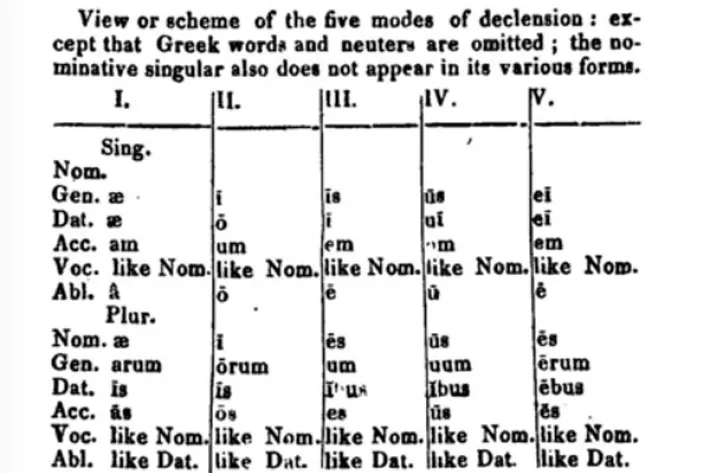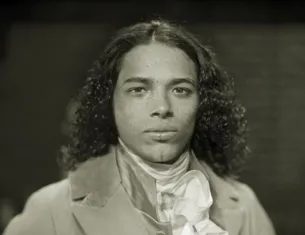Alexander Hamilton to His Young Son, 1791

Latin declension from Mairs introduction, Google books
Alexander Hamilton’s nine-year-old son Philip was at a school in Trenton, New Jersey, run by the Episcopal clergyman William Frazer, when he received this letter from his father. Hamilton’s December 5, 1791, letter to his son mixes advice and praise. It demonstrates Alexander’s high expectations for his promising young son—although Hamilton lays out strict academic guidelines, he also includes encouraging sentiments.
A Letter from Alexander Hamilton to Philip A. Hamilton, December 5, 1791
Philadelphia December 5
1791
I received with great pleasure My Dear Philip the letter which you wrote me last week. Your Mama and myself were very happy to learn that you are pleased with your situation and content to stay as long as shall be thought for your good. We hope and believe that nothing will happen to alter this disposition.
Your Master also informs me that you recited a lesson the first day you began, very much to his satisfaction. I expect every letter from him will give me a fresh proof of your progress. For I know that you can do a great deal, if you please, and I am sure you have too much spirit not to exert yourself, that you may make us every day more and more proud of you.
Your Mama has got an Ovid for you and is looking up your Mairs introduction. If it cannot be found tomorrow another will be procured and the books with the other articles she promised to send you will be forwarded in two or three days.
You remember that I engaged to send for you next Saturday and I will do it, unless you request me to put it off. For a promise must never be broken; and I never will make you one, which I will not fulfil as far as I am able. But it has occurred to me that the Christmas holidays are near at hand, and I suppose your school will then break up for some days and give you an opportunity of coming to stay with us for a longer time than if you should come on Saturday. Will it not be best for you, therefore, to put off your journey till the holidays? But determine as you like best and let me know what will be most pleasing to you.
A good night to my darling son. Adieu
A Hamilton
Source: Alexander Hamilton to Philip Hamilton, December 5, 1791, Founders Online, National Archives. Original source: The Papers of Alexander Hamilton, vol. 9, August 1791–December 1791, ed. Harold C. Syrett. New York: Columbia University Press, 1965, pp. 560–561.
A Letter from Alexander Hamilton to Philip A. Hamilton, December 5, 1791
Philadelphia December 5
1791
I received with great pleasure My Dear Philip the letter which you wrote me last week. Your Mama and myself were very happy to learn that you are pleased with your situation and content to stay as long as shall be thought for your good. We hope and believe that nothing will happen to alter this disposition.
Your Master also informs me that you recited a lesson the first day you began, very much to his satisfaction. I expect every letter from him will give me a fresh proof of your progress. For I know that you can do a great deal, if you please, and I am sure you have too much spirit not to exert yourself, that you may make us every day more and more proud of you.
. . . You remember that I engaged to send for you next Saturday and I will do it, unless you request me to put it off. For a promise must never be broken; and I never will make you one, which I will not fulfil as far as I am able. But it has occurred to me that the Christmas holidays are near at hand, and I suppose your school will then break up for some days and give you an opportunity of coming to stay with us for a longer time than if you should come on Saturday. Will it not be best for you, therefore, to put off your journey till the holidays? But determine as you like best and let me know what will be most pleasing to you.
A good night to my darling son. Adieu
A Hamilton
Source: Alexander Hamilton to Philip Hamilton, December 5, 1791, Founders Online, National Archives. Original source: The Papers of Alexander Hamilton, vol. 9, August 1791–December 1791, ed. Harold C. Syrett. New York: Columbia University Press, 1965, pp. 560–561.
Background
Alexander Hamilton’s nine-year-old son Philip was at a school in Trenton, New Jersey, run by the Episcopal clergyman William Frazer, when he received this letter from his father. Hamilton’s December 5, 1791, letter to his son mixes advice and praise. It demonstrates Alexander’s high expectations for his promising young son—although Hamilton lays out strict academic guidelines, he also includes encouraging sentiments.
Transcript
A Letter from Alexander Hamilton to Philip A. Hamilton, December 5, 1791
Philadelphia December 5
1791
I received with great pleasure My Dear Philip the letter which you wrote me last week. Your Mama and myself were very happy to learn that you are pleased with your situation and content to stay as long as shall be thought for your good. We hope and believe that nothing will happen to alter this disposition.
Your Master also informs me that you recited a lesson the first day you began, very much to his satisfaction. I expect every letter from him will give me a fresh proof of your progress. For I know that you can do a great deal, if you please, and I am sure you have too much spirit not to exert yourself, that you may make us every day more and more proud of you.
Your Mama has got an Ovid for you and is looking up your Mairs introduction. If it cannot be found tomorrow another will be procured and the books with the other articles she promised to send you will be forwarded in two or three days.
You remember that I engaged to send for you next Saturday and I will do it, unless you request me to put it off. For a promise must never be broken; and I never will make you one, which I will not fulfil as far as I am able. But it has occurred to me that the Christmas holidays are near at hand, and I suppose your school will then break up for some days and give you an opportunity of coming to stay with us for a longer time than if you should come on Saturday. Will it not be best for you, therefore, to put off your journey till the holidays? But determine as you like best and let me know what will be most pleasing to you.
A good night to my darling son. Adieu
A Hamilton
Source: Alexander Hamilton to Philip Hamilton, December 5, 1791, Founders Online, National Archives. Original source: The Papers of Alexander Hamilton, vol. 9, August 1791–December 1791, ed. Harold C. Syrett. New York: Columbia University Press, 1965, pp. 560–561.
Excerpt
A Letter from Alexander Hamilton to Philip A. Hamilton, December 5, 1791
Philadelphia December 5
1791
I received with great pleasure My Dear Philip the letter which you wrote me last week. Your Mama and myself were very happy to learn that you are pleased with your situation and content to stay as long as shall be thought for your good. We hope and believe that nothing will happen to alter this disposition.
Your Master also informs me that you recited a lesson the first day you began, very much to his satisfaction. I expect every letter from him will give me a fresh proof of your progress. For I know that you can do a great deal, if you please, and I am sure you have too much spirit not to exert yourself, that you may make us every day more and more proud of you.
. . . You remember that I engaged to send for you next Saturday and I will do it, unless you request me to put it off. For a promise must never be broken; and I never will make you one, which I will not fulfil as far as I am able. But it has occurred to me that the Christmas holidays are near at hand, and I suppose your school will then break up for some days and give you an opportunity of coming to stay with us for a longer time than if you should come on Saturday. Will it not be best for you, therefore, to put off your journey till the holidays? But determine as you like best and let me know what will be most pleasing to you.
A good night to my darling son. Adieu
A Hamilton
Source: Alexander Hamilton to Philip Hamilton, December 5, 1791, Founders Online, National Archives. Original source: The Papers of Alexander Hamilton, vol. 9, August 1791–December 1791, ed. Harold C. Syrett. New York: Columbia University Press, 1965, pp. 560–561.
